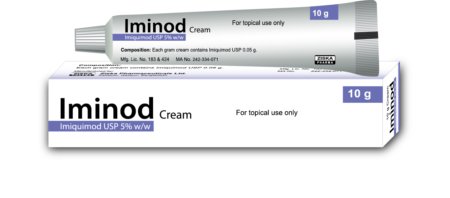
Type:10gm tube
Generic Name:Imiquimod Topical
Manufacturer:Ziska Pharmaceuticals Ltd.
Price:৳275.00
External genital warts, perianal warts/condyloma acuminata
Apply prior to normal sleeping hours and leave on skin for approximately 8 hr; then wash with mild soap and water; non-occlusive dressings such as cotton gauze/underwear may be used in management of skin reactions
Topical/Cutaneous Anogenital warts Adult: As 3.75% cream: Apply thinly onto affected area once daily until total clearance or for a Max duration of 8 weeks. As 5% cream: Apply 3 times weekly (non-consecutive days) for up to 16 weeks. Perianal warts Adult: As 3.75% cream: Apply thinly onto affected area once daily until total clearance or for a Max duration of 8 weeks. As 5% cream: Apply 3 times weekly (non-consecutive days) for up to 16 weeks. Superficial basal cell carcinoma Adult: As 5% cream: Apply 5 times weekly (on consecutive days) before bedtime for 6 weeks, assess response 12 weeks after completing treatment. Actinic keratoses Adult: As 2.5% or 3.75% cream: Apply unto face or scalp once daily before bedtime for 2 weeks, repeat course after a 2 weeks treatment-free interval, assess response 8 weeks after 2nd course. As 5% cream: Apply 3 times weekly before bedtime for 4 weeks, repeat for further 4 weeks with a 4-week interval, if necessary; or alternatively, apply 2 times weekly for 16 weeks.
<12 years: Safety and efficacy not established
Hypersensitivity
Imiquimod, an immune response modifier, is a Toll-like receptor 7 agonist that activates immune cells. The exact mechanism of action is not yet elucidated. It has no direct viral activity, however, it is effective against viral infection and acts as antitumour agent by induction of interferon-α (IFN-α) and other cytokines.
Patient with pre-existing autoimmune conditions, reduced haematologic reserve. Organ transplant patients. Not indicated for urethral, intravaginal, cervical, rectal, or intra-anal human papilloma viral disease. Pregnancy and lactation. Patient Counselling Avoid contact with eyes, lips, nostrils and broken skin. Avoid use of occlusive dressing. Avoid exposure to direct sunlight, UV lights, and tanning beds. Monitoring Parameters Assess for reduction in lesion size. Monitor for local skin reactions and signs and symptoms of hypersensitivity. Lactation: Unknown if distributed in breast milk; use caution
>10% Application site reaction (33%) URTI (15%) Erythema (54-61%) Erosion (29-31%) Excoriation/flaking (18-25%) Edema (12-17%) Itching (20%) 1-10% Sinusitis (7%) Burning (6%) Headache (5%) Carcinoma squamous (4%) Diarrhea (3%) Bleeding (3%) Stinging (3%) Pain (3%) Eczema (2%) Induration (2%) Tenderness (2%) Irritation (2%) Back pain (1%) Fatigue (1%) Atrial fibrillation (1%) Viral infection (1%) Dizziness (1%) Vomiting (1%) UTI (1%) Fever (1%) Rigor (1%) Alopecia (1%) Frequency Not Defined Headache Flu-like symptoms Myalgia